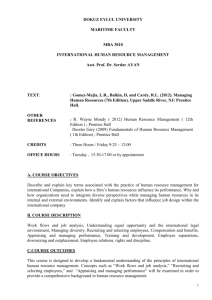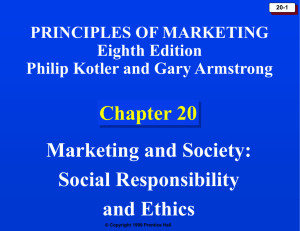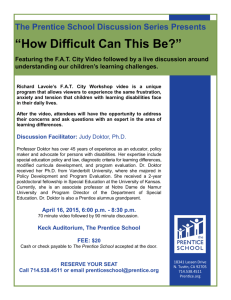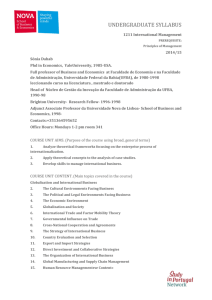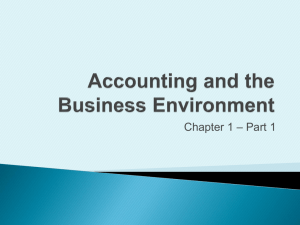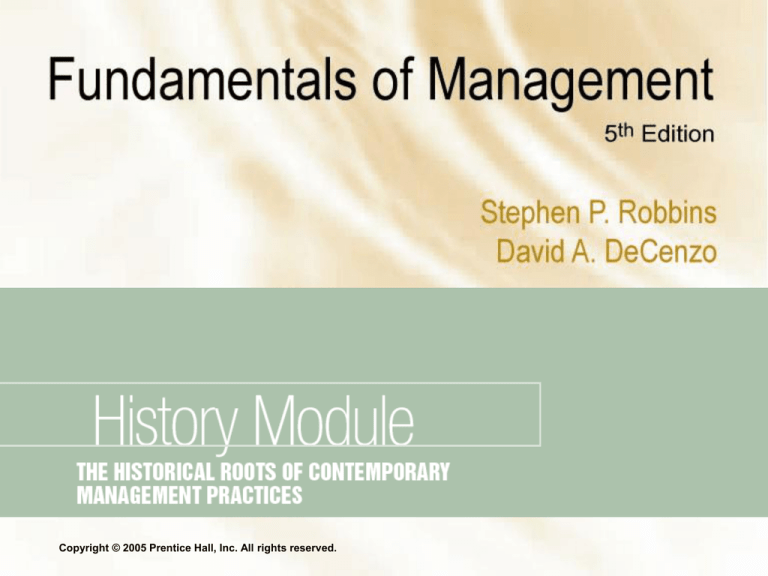
Copyright © 2005 Prentice Hall, Inc. All rights reserved.
The Pre-modern Era
• Ancient massive construction projects
– Egyptian pyramids
– Great Wall of China
• Michelangelo, the manager.
Copyright © 2005 Prentice Hall, Inc. All rights reserved.
Adam Smith’s Contribution To
The Field Of Management
• Wrote the Wealth of Nations (1776)
– Advocated the economic advantages that
organizations and society would reap from the
division of labor:
• Increased productivity by increasing each worker’s
skill and dexterity.
• Time saved that is commonly lost in changing tasks.
• The creation of labor-saving inventions and
machinery.
Copyright © 2005 Prentice Hall, Inc. All rights reserved.
The Industrial Revolution’s
Influence On Management
Practices
• Industrial revolution
– Machine power began to substitute for human power
• Lead to mass production of economical goods
– Improved and less costly transportation systems
became available
• Created larger markets for goods.
– Larger organizations developed to serve larger markets
• Created the need for formalized management practices.
Copyright © 2005 Prentice Hall, Inc. All rights reserved.
Classical Contributions
• Classical approach
– The term used to describe the hypotheses of
the scientific management theorists and the
general administrative theorists.
• Scientific management theorists
– Fredrick W. Taylor, Frank and Lillian Gilbreth, and
Henry Gantt
• General administrative theorists
– Henri Fayol and Max Weber
Copyright © 2005 Prentice Hall, Inc. All rights reserved.
Scientific Management
• Frederick W. Taylor
– The Principles of Scientific Management (1911)
• Advocated the use of the scientific method to define the “one
best way” for a job to be done
– Believed that increased efficiency could be achieved by
selecting the right people for the job and training them
to do it precisely in the one best way.
– To motivate workers, he favored incentive wage plans.
– Separated managerial work from operative work.
Copyright © 2005 Prentice Hall, Inc. All rights reserved.
Scientific Management
Contributors
• Frank and Lillian Gilbreth
– Bricklaying efficiency improvements
– Time and motion studies (therbligs)
• Henry Gantt
– Incentive compensation systems
– Gantt chart for scheduling work operations
Copyright © 2005 Prentice Hall, Inc. All rights reserved.
General Administrative Theory
• General administrative theorists
– Writers who developed general theories of what managers
do and what constitutes good management practice
– Henri Fayol (France)
• Fourteen Principles of Management: Fundamental or universal
principles of management practice
– Max Weber (Germany)
• Bureaucracy: Ideal type of organization characterized by division
of labor, a clearly defined hierarchy, detailed rules and regulations,
and impersonal relationships
Copyright © 2005 Prentice Hall, Inc. All rights reserved.
Human Resources Approach
• Robert Owen
– Scottish businessman and reformer who advocated for
better treatment of workers.
– Claimed that a concern for employees was profitable
for management and would relieve human misery.
• Hugo Munsterberg
– Created the field of industrial psychology—the
scientific study of individuals at work to maximize their
productivity and adjustment.
• Psychology and Industrial Efficiency (1913)
Copyright © 2005 Prentice Hall, Inc. All rights reserved.
Human Resources Approach
• Mary Parker Follett
– Recognized that organizations could be viewed from
the perspective of individual and group behavior.
– Believed that individual potential could only be
released by group association.
• Chester Barnard
– Saw organizations as social systems that require human
interaction and cooperation.
– Expressed his views on the “acceptance of authority” in
his book The Functions of the Executive (1938).
Copyright © 2005 Prentice Hall, Inc. All rights reserved.
Hawthorne Studies
• A series of studies done during the 1920s
and 1930s that provided new insights into
group norms and behaviors
– Hawthorne effect
• Social norms or standards of the group are the key
determinants of individual work behavior.
• Changed the prevalent view of the time that
people were no different than machines.
Copyright © 2005 Prentice Hall, Inc. All rights reserved.
Human Relations Movement
• Based on a belief in the importance of employee
satisfaction—a satisfied worker was believed to be
a productive worker.
• Advocates believed in people’s capabilities and
were concerned with making management
practices more humane.
– Dale Carnegie
– Abraham Maslow
– Douglas McGregor
Copyright © 2005 Prentice Hall, Inc. All rights reserved.
The Quantitative Approach
• Operations Research (Management Science)
– Evolved out of the development of
mathematical and statistical solutions to
military problems during World War II.
– Involves the use of statistics, optimization
models, information models, and computer
simulations to improve management decision
making for planning and control.
Copyright © 2005 Prentice Hall, Inc. All rights reserved.
Social Events That Shaped
Management Approaches
• Classical approach
– The desire for increased efficiency of labor intensive
operations
• Human resources approach
– The backlash to the overly mechanistic view of
employees held by the classicists.
– The Great Depression.
• The quantitative approaches
– World War II
Copyright © 2005 Prentice Hall, Inc. All rights reserved.
What is the Process Approach?
• Management theory jungle (Harold Koontz)
– The diversity of approaches to the study of
management—functions, quantitative emphasis, human
relations approaches—each offer something to
management theory, but many are only managerial
tools.
• Process approach
– Planning, leading, and controlling activities are circular
and continuous functions of management.
Copyright © 2005 Prentice Hall, Inc. All rights reserved.
The Systems Approach
• Defines a system as a set of interrelated and
interdependent parts arranged in a manner
that produces a unified whole
– Closed system : a system that is not influenced
by and does not interact with its environment
– Open system: a system that dynamically
interacts with its environment
– Stakeholders: any group that is affected by
organizational decisions and policies
Copyright © 2005 Prentice Hall, Inc. All rights reserved.




